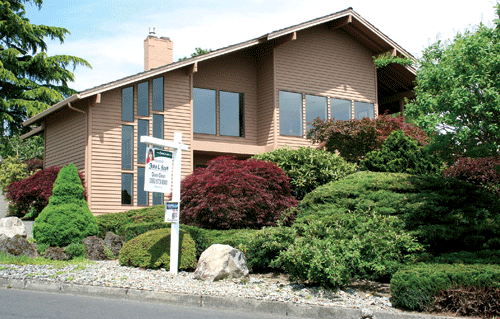
In March, Clark County had 6.4 months of housing inventory, a statistic tracked by Portland-based RMLS (Regional Multiple Listing Service) that describes how long it would take to sell every for-sale property if no new listings were added. That’s the fastest rate at which homes have cleared the market since September 2006.
“Sales are better, however the flip side of that is that more of them were short sales than there were two years ago,” said Dave Dumas, managing broker at Keller Williams in Vancouver. Short sales, where a property sells for less than what is owed on the mortgage, often cause less damage to property owners’ credit ratings than foreclosures, but require approval of the lender. It’s an arduous process that can draw out how long it takes to sell a home, Dumas said.
Even so, “There’s more real estate moving now than two years ago,” he said.
“The economy is still very fragile,” warned Monica Bean, a real estate agent with Century 21. Though her business has picked up in recent months, she’s worried that the latest gains may be fleeting.
“If hiring does not continue, if gas prices go up, that will take away disposable income; people won’t feel willing to invest,” Bean said. “I’m personally hoping we see a gradual incline away from the worst. But the economy can put a dent in the housing recovery we’re seeing right now. It’s hard to say.”
Recent history highlights another reason that many real estate insiders are cautious about declaring the housing market in full recovery. An $8,000 tax credit that was available through April 2010 drove many first-time buyers into the market, pushing inventories temporarily down to around seven months. But when the tax credit expired, buyers seemed to evaporate, and the pace of sales slowed. By February 2011, inventory had climbed to 12.1 months in Clark County. Real estate brokers who had celebrated prematurely found themselves again facing a painfully slow market.
CLARK COUNTY HOUSING INVENTORY
Months it would take to sell all currently listed properties
March 2006 3.8
March 2007 7
March 2008 11.9
March 2009 11.7
March 2010 7.7
March 2011 8.3
March 2012 6.4
Source: RMLS
That spurred many sellers to accept lower offers on their properties, and as home values dropped – to a median of $176,000 this March, from $265,000 in March 2007 – potential buyers started taking a second look.
Investors have become a growing force in Clark County real estate, with some buying properties at bargain basement prices to rent out at more than the cost of a mortgage, and others improving beat-up homes and then flipping them at a profit, said Scott Anthony, broker in charge of selling bank-foreclosed properties for Windermere Real Estate Stellar Group in Vancouver.
Though Bean is aware of the growth in real-estate investment, she said her own clients are all people who want to live in their own homes. Many are first-time buyers looking to take advantage of historically low interest rates and low property values. Properties priced under $250,000 are selling much more quickly than those priced higher, she said.
Anthony cautions that inventory would also surge upward if banks were to flood the market with foreclosures.
According to an Oregonian analysis of foreclosure data, between half and three quarters of foreclosed houses in parts of central and east Vancouver have not yet been listed for sale, and up to half of foreclosures in Camas and Salmon Creek are likewise not yet on the market.
If all those properties were listed for sale at once, Clark County inventories would spike and home sale prices could fall, Anthony said.
“I believe that banks have realized that if they flood the market with everything they have, they are only doing themselves harm,” he said. As a result, he expects many banks to gradually list foreclosures over the coming years. That would drag out any housing market recovery, but would also allow inventories to stay low and prices to gradually climb.
Meanwhile, many current home owners remain nervous about listing their properties for sale, Bean said. If they bought during the peak of the market, they could find themselves only able to sell at a loss.
“People who don’t have a choice, because of death, divorce, or something like that, are trying to get what they can in a sale,” Bean said. “And people who can hold on to their homes will do that, and wait until the market improves.”



